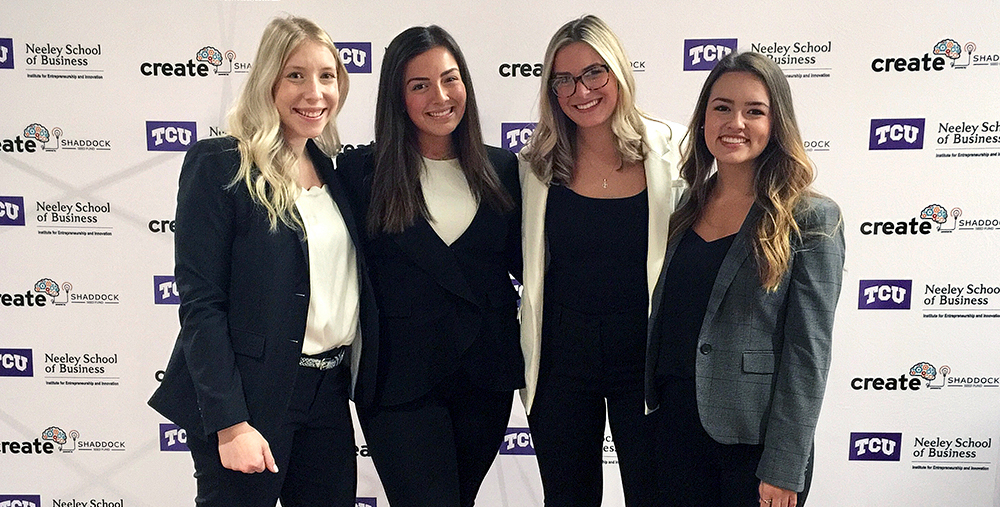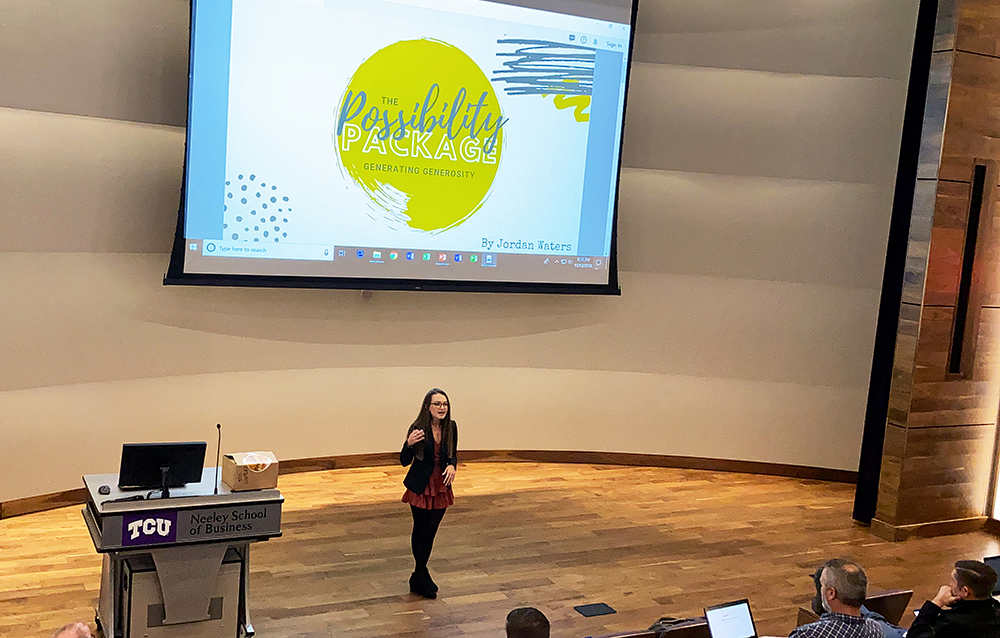In the Fall 2019 semester, 44 teams of 111 students from all eight TCU schools and colleges brought their ideas to CREATE–Powered by the Shaddock Seed Fund; 29 of those 44 received funding, mentoring and other assistance.
June 22, 2020
By Elaine Cole
Each semester, students from all across campus, representing every school and a variety of majors, come to the Neeley School of Business with one thing in common: a great idea for creating a new business, product or service.
“Whether it is an idea on a napkin or an idea at the prototype stage, if it is a viable plan our goal is to lift it off the ground and give it momentum,” said Antonio Banos, assistant director of the Institute for Entrepreneurship and Innovation and program director for CREATE—Powered by the Shaddock Seed Fund.

CREATE is so popular that the Institute added a second pitch date each semester to accommodate the number of TCU students interested in growing their business ideas.
More than a pitch competition, CREATE is a cross-campus startup engine designed to get feasible ideas off the ground. It provides experience for both sides of a startup: raising money and investing money. Student entrepreneurs take advantage of pitch sessions, workshops, mentors, funding advice and legal assistance. Student investors (TCU MBAs) practice deal sourcing, due diligence and milestone tracking. It’s a win for both sides.
“CREATE is unique in that it enables a sandbox for both budding entrepreneurs as well as investors in training,” said Rodney D’Souza, executive director of the Institute for Entrepreneurship and Innovation.
CREATE isn’t a charity. The seed funds allocated are in the form of grants, but the judges, TCU MBAs, consider this an investment. The students who pitch must prove that their idea is for a viable new business.
The Pitch
They lined up outside the Shaddock Auditorium last fall. Adriana Facchina and her team of entrepreneurship, finance, biophysics and engineering majors practiced their pitch. Derrick Mokaleng, entrepreneurship major and student athlete, adjusted the SpikeShields he invented for track athletes and wrestlers. Jordan Waters, education major, boxed up the Possibility Package she developed for nonprofits and for-purpose companies. Ryan Hinchcliff, design major and Army veteran, checked the board game he invented.
Inside the auditorium was a panel of TCU MBA Venture Fellows in training, the judges who would determine if their idea was worth funding.
Nervous? Yes. Committed to their idea? Absolutely.
Bill Shaddock BBA ’73, CEO of The Shaddock Companies and the man behind the Shaddock Seed Fund, attended the pitch session. “I was so impressed by the students and their pitches. This gives them a taste of the real thing and something of significance on their résumés,” he said. “What a great job you are doing to nurture them in their entrepreneurial pursuits.”
The Deep Dive
When students are chosen from their pitches they are given resources to achieve milestones. They then advance to the deep dive, where TCU MBA Venture Fellows perform due diligence on the businesses and scrutinize finances, marketing, feasibility, milestones and more.
The TCU MBA Venture Fellows immerse themselves in this unique opportunity to invest real money into real ideas.
“For those of us who aspire to be early stage investors someday, this gives us the opportunity to put our skills in due diligence, opportunity recognition and business evaluation to the test,” said Andrew Hicks MBA ’21. “We also learn how to be introspective about our own entrepreneurial pursuits.”
The TCU MBA Venture Fellows can invite other business ideas from across TCU to the deep dive, not just the early stage ideas that make it through the pitch sessions, which gives the them even more opportunities for investing.

Beyond the Pitch
Popular shows like “Shark Tank” can make it look like pitching and winning is all there is to success, but there is much more to starting and maintaining a business. In addition to funding, students need guidance, direction and advice from experts. To help them advance their ideas, CREATE provides workshops, mentors, investors-in-residence and legal assistance
All TCU students are invited to learn about starting a business through workshops offered by the Institute for Entrepreneurship and Innovation. Topics include How to Evaluate Startup ideas; How to Set KPIs and Goals; Startup Financial Pitfalls and How to Avoid Them; and How to Finance Your Startup.
Students interested in raising money from equity investors can meet with investors-in-residence at the Institute for Entrepreneurship and Innovation, who help guide early stage companies in their quest for funding.
For legal assistance, the Institute partners with Texas A&M University School of Law’s legal clinics to provide free legal assistance for incorporating, partnership agreements, IP, copyrights and more.
Mentorship is important to build and grow sustainable companies, so CREATE matches mentors to each student team based on the product/service/industry and stage of development. Mentors are faculty and alumni who volunteer to work alongside student entrepreneurs to provide guidance in everything from naming the product, to manufacturing options, to audience surveys.
Charlie McKee BBA ’19, founder and CEO of Adaptafit, was in these students’ shoes not long ago, so he volunteers to mentor them through the early stages of their ideas.
“A lot of the stuff they’re going through is still very fresh in my mind,” he said. “The main thing I try to encourage them to do is reach out to stakeholders who are connected to the problem they’re trying to solve. You can’t learn everything by finding data online. If you really want to learn about a problem you have to get out and talk to people.”
Demo Day and Presentations
At the end of each semester, teams demonstrate their products or services to students, faculty and staff across campus, plus members of the DFW community, to test their ideas in the market. This is also an opportunity for them to spread the word about CREATE to even more students. At the end of the day, one team is chosen by popular vote to receive a cash prize.
Editor’s Note: CREATE, like all of TCU, went to a remote education format for Spring 2020. All the opportunities mentioned in this story continued to be offered successfully in the remote format.
.jpg?ext=.jpg)
